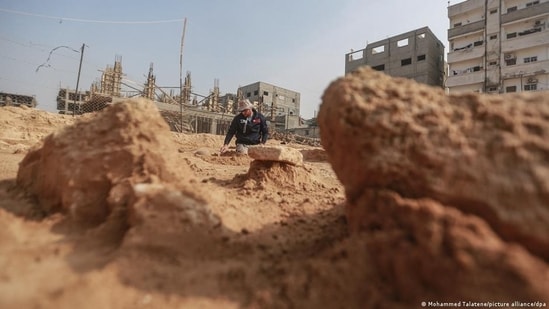'Complete' Roman-era cemetery discovered in Gaza Strip
A 2,000-year-old Roman cemetery and necropolis containing up to 80 tombs was unearthed during housing construction in the northern Gaza Strip.
In January this year, Palestinian construction workers came across subterranean ruins near the town of Beit Lahia in the Gaza Strip near the Israeli border. A housing development was to be built on the site before the remnants of dozens of ancient tombs were gradually unearthed, announced Hamas, the Palestinian authority in Gaza, on Monday (13.12.2022). (Also Read | 'Gamocha', a symbol of the culture and identity of Assam receives GI tag)

Hiyam al-Bitar, a researcher from the Hamas-run Ministry of Antiquities and Tourism, said a total of 63 graves have been identified, adding that bones and artifacts from one tomb dated back to the second century.
"We expect to find 75 to 80 tombs in total," noted the head of the excavation team, Fasl al-Atal. He called the discovery the "first complete Roman-era cemetery found in Gaza."
Al-Bitar said her ministry is working with a team of French experts to learn more about the site, which is currently blocked off from the public.
Yet construction on the housing project has continued — the site is part of an Egyptian-funded residential reconstruction project after the 11-day war in May 2021 between Israel and groups in blockaded Gaza.
During renewed excavations, French archaeologist Rene Elter, from the French Biblical and Archaeological School of Jerusalem, visited the site and discovered a tomb with "polychrome paintings depicting crowns and garlands of laurel leaves" and "jars intended for funeral libations," he told AFP in June.
Archaeological site of 'great importance'
The Roman burial site is not far from the ruins of the Greek port of Anthedon near ancient Ascalon — now the Israeli city of Ashkelon on the border with the Gaza Strip.
Jamal Abu Reda of the Ministry of Antiquities said the excavation site was of "great importance" and probably an "extension of the site" of ancient Anthedon.
Archaeological excavations in Israel as well as in the Palestinian territories are always politically contentious, however. While finds in Israel and the West Bank have been used to justify territorial claims, especially in Jerusalem's Old City, few archaeologists have been active Gaza — despite its rich history.
Under the current blockade by Israel of the 2 million people living in the enclave, and the regular armed conflict in the region, that is unlikely to change soon.
Gaza: 'The same great history'
Rene Elter, who in September observed Byzantine mosaics dating from the 5th to 7th centuries that were uncovered in the central Gaza Strip, says that Gaza antiquities are just as impressive as in Israel.
"There is no difference between what you can find in Gaza and on the other side of the barrier in Israel," Elter said in June. "It's the same great history."
However, the lack of funding, including from tourism, limits the ability to excavate sites in the Gaza Strip which has been blockaded by Israel since Hamas came to power in 2007.
"In Gaza, a lot of sites have disappeared because of conflict and construction, but the territory is an immense archaeological site which needs many teams of experts," Elter added.
"The image of Gaza is often associated with violence, but its history is bursting with archaeological treasures that need to be protected for future generations," said Jihad Abu Hassan, director of the local Premiere Urgence mission, also in June.
Now stakes and fences have been erected around the Roman necropolis, which is watched over by guards to counteract the illegal trade in antiquities.
Commitment to cultural heritage preservation
Unfortunately, not all developers report archaeological finds on construction sites.
"They are afraid of not being compensated if the construction work is stopped," says Abu Hassan, adding that "we lose archaeological sites every day."
Local media reported looting when the site was first discovered, with people using donkey-drawn carts to haul away items like a covered casket and inscribed bricks.
Exploring the archaeological sites has also become more difficult due to the blockade, which makes it difficult to bring required materials over the border.
Nevertheless, sensational archaeological finds are becoming a regular event.
In addition to the Roman cemetery and the mosaics from the 5th to the 7th centuries found in Gaza in 2022, a stone statue of an ancient goddess over 4,500 years old was discovered by a farmer in April.
Catch your daily dose of Fashion, Health, Festivals, Travel, Relationship, Recipe and all the other Latest Lifestyle News on Hindustan Times Website and APPs.



